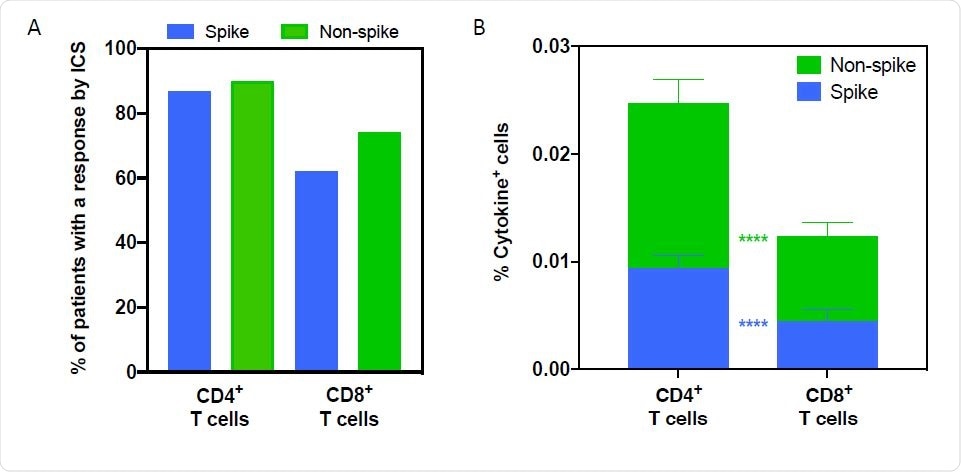As the COVID pandemic continues to ravage across the globe, it is yet to be determined if prior severe acute respiratory syndrome coronavirus 2 (SARS-CoV-2) infection provides lasting immunity. Though many studies have shown that people who have recovered from the infection develop antibodies that last for months, further research is still imperative.
The researchers in the United Kingdom aimed to determine the antibody responses against SARS-CoV-2 and how long they last.

 This news article was a review of a preliminary scientific report that had not undergone peer-review at the time of publication. Since its initial publication, the scientific report has now been peer reviewed and accepted for publication in a Scientific Journal. Links to the preliminary and peer-reviewed reports are available in the Sources section at the bottom of this article. View Sources
This news article was a review of a preliminary scientific report that had not undergone peer-review at the time of publication. Since its initial publication, the scientific report has now been peer reviewed and accepted for publication in a Scientific Journal. Links to the preliminary and peer-reviewed reports are available in the Sources section at the bottom of this article. View Sources
The study
The immune response to SARS-CoV-2 is essential in controlling primary infection and preventing re-infection, which has been seen in some cases throughout the pandemic. Yet, there is a growing concern that immune responses following natural infection may not be sustained, predisposing a person to recurrent infection.
To arrive at the study findings, the researchers studied the magnitude and phenotype of the SARS-CoV2 cellular immune response in 100 donors at six months after having a primary infection. The team linked this to the antibody level profile against spike, nucleoprotein, and the receptor-binding domain (RBD) over the past six months.

Overall detection of SARS-CoV-2-specific T cell responses by ICS. A. Proportion of donors (N=96) with a detectable IFN-! and/or IL-2 response by ICS for CD4+ T cells and CD8+ T cells against Spike and Nonspike proteins 6 months following primary infection. B. Aggregated IFN-! and IL-2 ICS responses for CD4+ and CD8+ T cells against Spike and Nonspike proteins. The significance was determined using Wilcoxon matchedpairs signed rank test, p < 0.001
What the study found
When a pathogen enters the body and causes infection, the immune system works to fight it off. An innate immune response happens, wherein cells secrets interferons and other chemicals like cytokines. Interferons interfere with viral replication, while cytokines conduct cell signaling to aid in communication and stimulate the movement of the cells towards the site of infection.
Meanwhile, an adaptive immune response is a specific response to the infection, wherein white blood cells such as T cells (cellular response) and B cells (antibody response) recognize if cells are infected to increase the number of cells to fight the infection.
In the study, the researchers found that T-cell immune responses to SARS-CoV-2 were detected in all the donors. Further, the donors all have predominant CD4+ T cell responses with string Interleukin 2 (IL-2) cytokine expression.
The team also revealed that the median T-cell responses were 50 percent higher in those who had experienced an initial symptomatic infection. This means that the primary infection's severity provides a set-point for cellular immunity that lasts for at least six months.
The pattern has also been observed in the first few weeks after acute SARS-CoV-2 infection in patients recovering from severe versus mild disease. The findings reveal that a response to higher viral loads and inflammatory mediators during acute infection may provide a higher antibody response.
"Our findings demonstrate that robust cellular immunity against SARS-CoV-2 is likely to be present within the great majority of adults at six months following asymptomatic and mild-to-moderate infection," the team concluded.
"These features are encouraging in relation to the longevity of cellular immunity against this novel virus and are likely to contribute to the relatively low rates of re-infection that have been observed to date. Further studies will be required to assess how these immune responses are maintained over the longer term," the team added.
Detecting how long the immunity against SARS-CoV-2 is crucial in the development of effective vaccines. This can help in the response against the coronavirus pandemic, which has now infected over 47.32 million people and killed at least 1.21 million.
So far, of all the COVID-19 cases recorded, 31.5 million have recovered.

 This news article was a review of a preliminary scientific report that had not undergone peer-review at the time of publication. Since its initial publication, the scientific report has now been peer reviewed and accepted for publication in a Scientific Journal. Links to the preliminary and peer-reviewed reports are available in the Sources section at the bottom of this article. View Sources
This news article was a review of a preliminary scientific report that had not undergone peer-review at the time of publication. Since its initial publication, the scientific report has now been peer reviewed and accepted for publication in a Scientific Journal. Links to the preliminary and peer-reviewed reports are available in the Sources section at the bottom of this article. View Sources
Source:
Journal references:
- Preliminary scientific report.
Zuo, J., Dowell, A., Pearce, H., Verman, K., et al. (2020). Robust SARS-CoV-2-specific T-cell immunity is maintained at 6 months following primary infection. bioRxiv. https://www.biorxiv.org/content/10.1101/2020.11.01.362319v1
- Peer reviewed and published scientific report.
Zuo, Jianmin, Alexander C. Dowell, Hayden Pearce, Kriti Verma, Heather M. Long, Jusnara Begum, Felicity Aiano, et al. 2021. “Robust SARS-CoV-2-Specific T Cell Immunity Is Maintained at 6 Months Following Primary Infection.” Nature Immunology, March, 1–7. https://doi.org/10.1038/s41590-021-00902-8. https://www.nature.com/articles/s41590-021-00902-8.